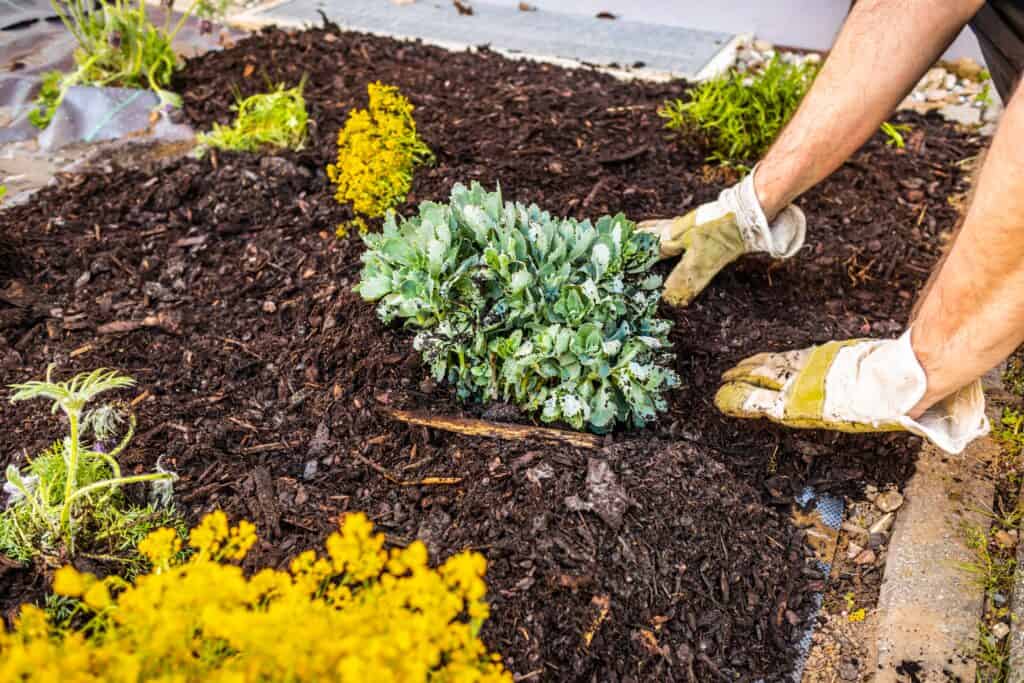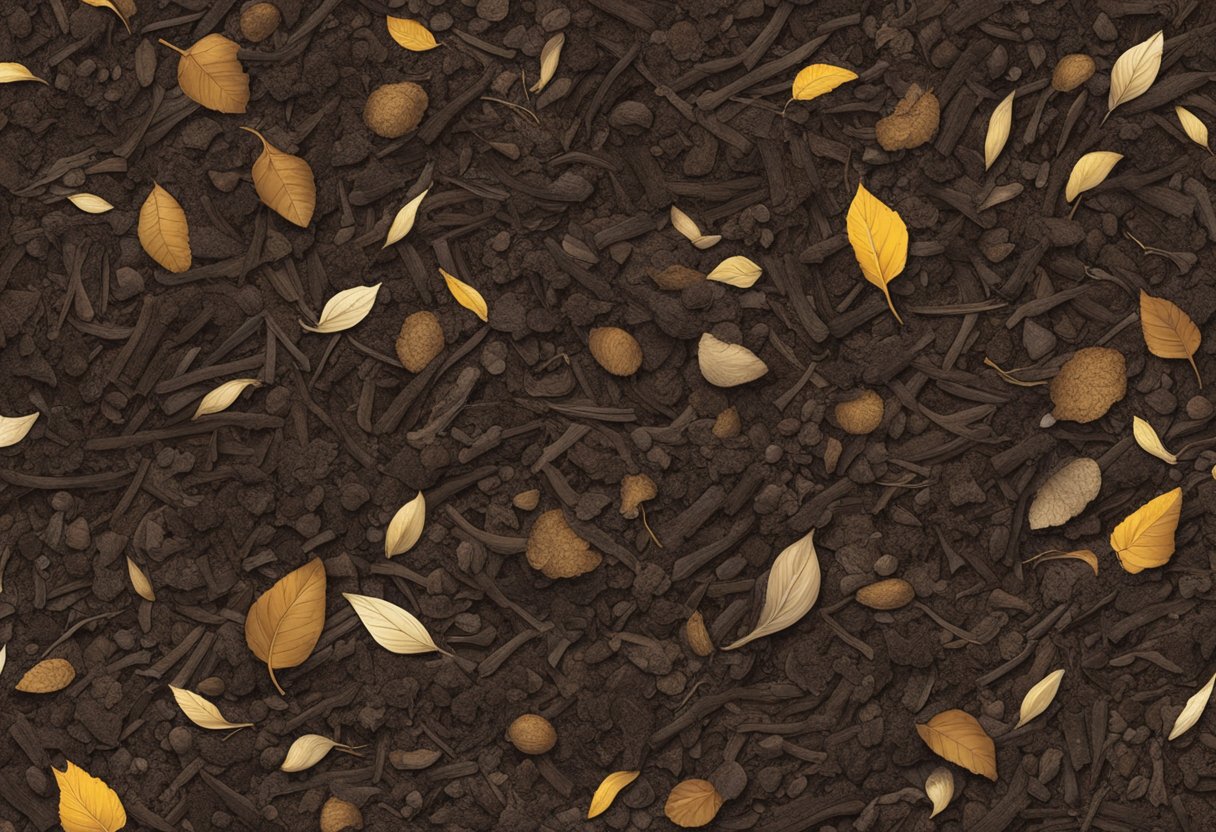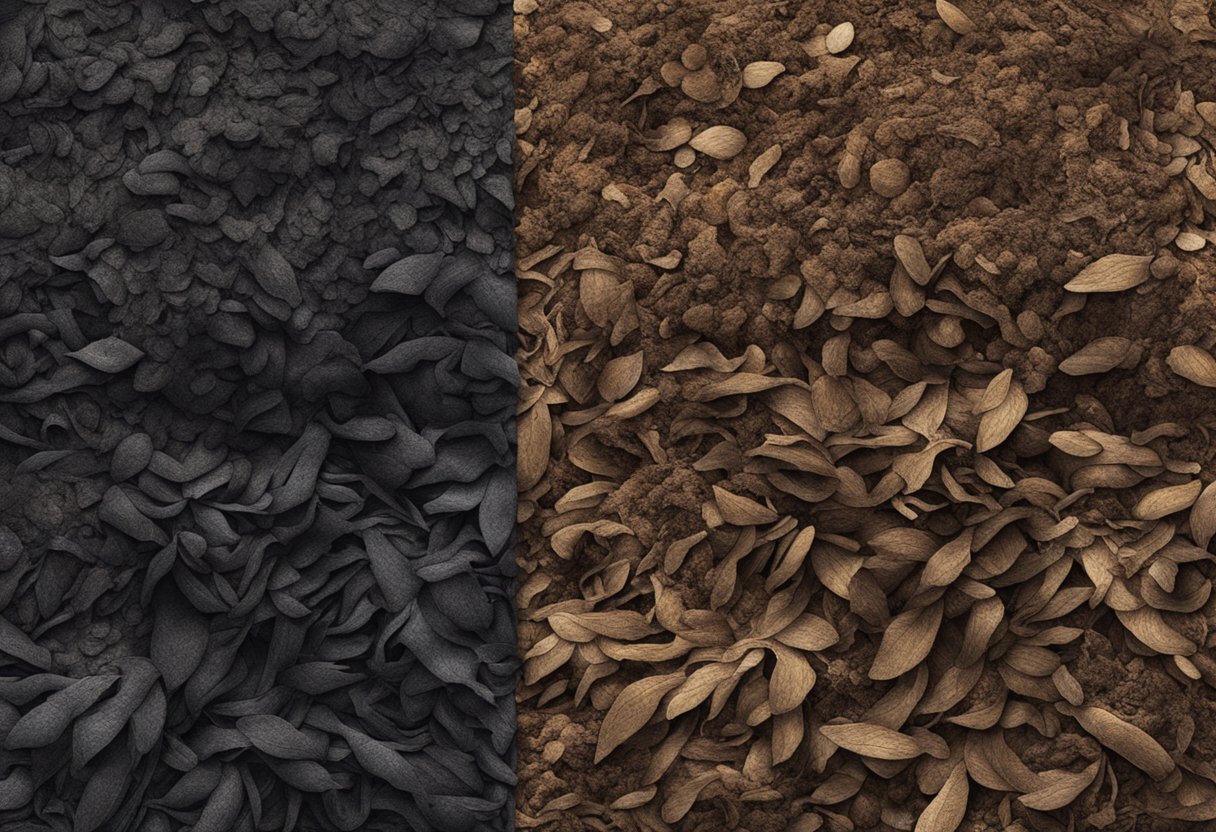As an Amazon Associate I earn from qualifying purchases.
At A Glance
Compost and mulch serve different purposes in the garden but can be complementary. Compost is decomposed organic matter that enriches the soil with nutrients, improves soil structure, and enhances microbial activity when mixed into the soil. Mulch, on the other hand, is a layer of organic or inorganic material placed on top of the soil to retain soil moisture, reduce erosion, provide nutrients, and suppress weed growth. While compost feeds the soil, mulch protects it.
Compost and mulch are two important components in organic gardening. They both improve the soil quality and help plants grow healthier. However, there are some differences between the two that are worth noting.

Compost is organic matter that has been decomposed and broken down into a nutrient-rich soil amendment. It is made up of things like leaves, grass clippings, and food scraps. Compost is used to add nutrients to the soil and improve its structure. It can also help retain moisture and suppress weeds.
Mulch, on the other hand, is a layer of organic material that is spread over the soil surface. It can be made up of things like wood chips, straw, or leaves. Mulch is used to protect the soil from erosion, retain moisture, and regulate soil temperature. It can also suppress weed growth and help reduce the need for watering. While compost and mulch share some similarities, they serve different purposes in the garden.
Understanding Compost
Compost is a nutrient-rich soil amendment that is made from decomposed organic matter. It is created through the process of composting, which involves breaking down kitchen scraps, leaves, grass clippings, and other organic materials.
To create compost, organic matter is placed in a compost bin and allowed to decompose over time. During the decomposition process, microorganisms break down the organic matter, releasing nitrogen and other nutrients into the soil.
Compost can be made from a variety of organic materials, including household items like coffee grounds, eggshells, and vegetable scraps. These materials are typically classified as either “brown” or “green” compost. Brown compost includes materials like leaves, twigs, and paper, while green compost includes materials like grass clippings, food waste, and manure.
To create high-quality compost, it is important to balance the ratio of brown to green compost. This is because brown compost provides carbon, while green compost provides nitrogen. A good ratio is typically 2 parts brown compost to 1 part green compost.
The finished product of composting is called finished compost or humus. It is a dark, crumbly material that is rich in nutrients and can be used as a soil amendment. Compost can also be used as a mulch, providing a protective layer over the soil and helping to retain moisture.
Using compost as mulch has many benefits, including improving soil structure, increasing soil fertility, and reducing the need for chemical fertilizers. Additionally, using household items like kitchen scraps to create compost is an environmentally friendly way to reduce waste and improve soil health.
Understanding Mulch
Mulch is any material that is spread over the soil surface to protect it from the elements. It can be organic or inorganic, and it has many benefits for your garden. Organic mulches, such as shredded leaves, wood chips, and straw, are the most common types of mulch used in gardens.
Organic mulch is an excellent way to improve soil quality and fertility. As it decomposes, it releases nutrients into the soil, promoting healthy plant growth. Organic mulch also helps to retain moisture in the soil, reducing the need for watering. It also insulates the soil, keeping it warmer in the winter and cooler in the summer.
Inorganic mulch, such as stones, gravel, and landscape fabric, is also commonly used in gardens. These types of mulch do not decompose and, therefore, do not add nutrients to the soil. However, they are excellent at suppressing weeds and retaining moisture in the soil.
There are many types of organic and inorganic mulch available, each with its own unique benefits. Rubber mulch and plastic mulch, for example, are popular choices for their durability and long-lasting nature. Cedar chips are another popular choice for their pleasant aroma and insect-repelling properties.
When choosing a mulch for your garden, it is essential to consider the type of plants you are growing and the conditions in your garden. For example, pine needles are an excellent choice for acid-loving plants, while stones and gravel are better suited for areas with high foot traffic.
Overall, mulch is an essential component of any healthy garden. Whether you choose organic or inorganic mulch, it can help to improve soil quality, retain moisture, suppress weeds, and promote healthy plant growth.
Compost vs Mulch: Key Differences

As a gardener, it’s important to understand the differences between compost and mulch to optimize the health of your plants and soil. While both compost and mulch are organic materials, they serve different purposes in the garden.
Compost is a nutrient-rich soil amendment that is made from decomposed organic matter, such as food scraps, leaves, and grass clippings. It is typically mixed into the soil to improve soil structure, water retention, and nutrient availability. Composting is a natural process that breaks down organic matter into a nutrient-rich soil amendment over time.
On the other hand, mulch is a layer of organic material that is spread on top of the soil to help retain moisture, suppress weeds, and regulate soil temperature. Mulch can be made from a variety of materials, such as wood chips, straw, leaves, and grass clippings. Unlike compost, mulch is not mixed into the soil.
One key difference between compost and mulch is their location in the garden. Compost is typically mixed into the soil, while mulch is placed on top of the soil. Compost provides nutrients to the plants and soil, while mulch helps to regulate soil temperature and moisture levels.
Another difference between compost and mulch is their texture. Compost is typically finer in texture than mulch, and it is often used to improve soil structure. Mulch, on the other hand, is coarser in texture and is used to suppress weeds and retain moisture.
In summary, compost and mulch are both important components of a healthy garden, but they serve different purposes. Compost is a nutrient-rich soil amendment that is mixed into the soil to improve soil structure and provide nutrients to plants. Mulch, on the other hand, is a layer of organic material that is placed on top of the soil to help retain moisture, suppress weeds, and regulate soil temperature.
Benefits of Compost

Compost is an excellent natural fertilizer that can provide a range of benefits to your garden soil and plants. Here are some of the benefits of compost:
- Improves soil structure: Compost can help improve the structure of your garden soil by adding organic matter and improving drainage. This can help create a healthier environment for your plants to grow in.
- Adds nutrients to the soil: Compost is rich in nutrients such as nitrogen, phosphorus, and potassium, which are essential for plant growth. By adding compost to your garden soil, you can help improve the nutrient content of the soil and provide your plants with the nutrients they need to thrive.
- Increases soil microorganisms: Compost contains a range of microorganisms that can help improve the health of your garden soil. These microorganisms can help break down organic matter, improve soil structure, and increase nutrient availability.
- Reduces the need for synthetic fertilizers: By using compost as a natural fertilizer, you can reduce the need for synthetic fertilizers that can be harmful to the environment.
- Encourages earthworms and other beneficial organisms: Compost can help create a healthy environment for earthworms and other beneficial organisms that can help improve soil structure and nutrient availability.
- Improves soil quality: By improving soil structure, increasing nutrient content, and encouraging beneficial organisms, compost can help improve the overall quality of your garden soil.
Composting can be done in a variety of ways, including using a compost bin, vermicomposting with worms, or using manure. Regardless of the method, composting can provide a range of benefits to your garden soil and plants.
Benefits of Mulch
Mulch is an essential component of any garden or landscape. It offers a variety of benefits, including:
Moisture retention
Mulch helps to retain moisture in the soil by reducing evaporation. This is especially important during hot and dry weather conditions. By retaining moisture, mulch ensures that plants have access to the water they need to grow and thrive.
Weed suppression
Mulch helps to suppress weed growth by blocking sunlight. This reduces the amount of weed seeds that can germinate in the soil. This can save you time and effort in the long run by reducing the need for weeding.
Protection from extreme weather
Mulch can protect plants from extreme weather conditions such as heavy rain, wind, and snow. During the winter, mulch can insulate the soil and protect plants from the cold. In the summer, it can help to keep the soil cool and protect plants from the heat.
Visual appeal
Mulch can also add visual appeal to your garden or landscape. It comes in a variety of colors and textures, allowing you to create a unique look that complements your plants and other landscaping elements.
Top dressing
Mulch can be used as a top dressing to improve the appearance of your garden beds. It can also be used to cover exposed soil around trees and shrubs, which can help to prevent erosion and protect the roots from damage.
Overall, mulch is an excellent addition to any garden or landscape. It offers a variety of benefits that can help to improve the health and appearance of your plants, while also reducing the amount of time and effort required to maintain them.
Application of Compost and Mulch
As a gardener, I often use both compost and mulch in my garden landscape. Compost and mulch both serve different purposes, and knowing when to use each is important for maintaining healthy plants and soil.
Compost is a nutrient-rich organic material that is made up of decomposed food scraps, yard waste, and other organic matter. It is an excellent fertilizer that can be used to improve soil structure, promote healthy plant growth, and increase soil moisture retention. Compost can be mixed into the soil before planting or side-dressed during the growing season.
Mulch, on the other hand, is a layer of material that is spread on top of the soil to protect it from erosion, maintain soil moisture, and suppress weed growth. Mulch can be made from a variety of organic materials such as leaves, grass clippings, and wood chips. It can also be used to insulate soil and protect plants from extreme temperatures.
When deciding whether to use compost or mulch, it’s important to consider the specific needs of your garden. If you need to fertilize your plants, compost is the best option. If you want to protect your soil from erosion and maintain soil moisture, mulch is the better choice.
In conclusion, both compost and mulch are essential tools for any gardener. By understanding the benefits of each, you can make informed decisions about how to use them in your garden landscape.
Choosing Between Compost and Mulch
When it comes to choosing between compost and mulch, it’s important to understand the differences between the two and how they can benefit your garden. Compost is decomposed organic matter that can be added to garden soil to improve its quality and provide nutrients for plant growth. Mulch, on the other hand, is a layer of material that is placed on top of soil to help retain moisture, suppress weeds, and regulate soil temperature.
If you’re looking to improve the quality of your garden soil, adding compost is a great option. Compost is rich in nutrients and can help improve soil structure, making it easier for plants to grow. It also helps to promote healthy microbial activity in the soil, which can further improve plant growth. To make compost, you can use a variety of organic materials such as kitchen scraps, yard waste, and even shredded paper.
Mulch, on the other hand, is a great option for those looking to suppress weeds and retain moisture in their garden. It can be made from a variety of materials such as sawdust, shredded bark, and even black plastic. Mulch also helps to regulate soil temperature, keeping it cooler in the summer and warmer in the winter.
When it comes to choosing between compost and mulch, it’s important to consider your specific gardening needs. If you’re looking to improve soil quality and promote plant growth, compost is a great option. If you’re looking to suppress weeds and retain moisture, mulch is a better choice. Ultimately, using both compost and mulch in your garden can help create a thriving garden environment.
